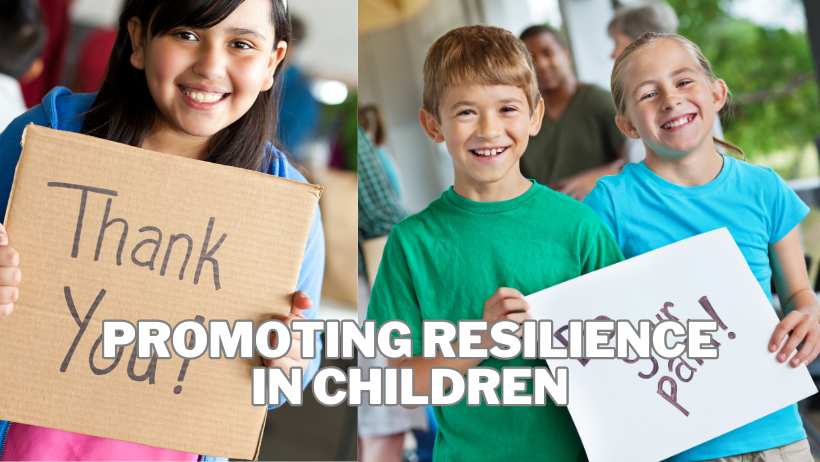
Promote resilience in children with essential tips for parents. Discover strategies to nurture resilience and help your child thrive in the face of challenges.
As a parent, you play a crucial role in shaping your child’s ability to bounce back from challenges and setbacks. In our fast-paced and unpredictable world, promoting resilience in children has become more essential than ever. This article offers valuable strategies and tips to help you nurture resilience in your child, enabling them to thrive in the face of adversity and build a solid foundation for a successful future. From fostering a growth mindset to teaching problem-solving skills, you will discover actionable steps that empower you to support your child’s resilience journey.

Understanding Resilience
Resilience is a concept that plays a crucial role in shaping our ability to overcome challenges and bounce back from adversity. It involves the capacity to adapt and thrive in the face of difficult circumstances, and it is a valuable skill for children to develop. Resilience is not about avoiding or denying pain, but rather about building the strength and skills necessary to navigate through life’s ups and downs with confidence and grace.
Defining resilience
Resilience can be defined as the ability to maintain a positive attitude and effectively cope with stress, setbacks, and obstacles. It is the capacity to endure and persevere in the face of adversity, as well as the ability to learn and grow from these experiences. Resilience is not a fixed trait; it can be cultivated and developed over time through supportive environments, positive relationships, and the acquisition of various skills and strategies.

Importance of resilience in children
Resilience is of utmost importance in the lives of children. The ability to bounce back from challenges helps children develop a strong sense of self-esteem and self-efficacy. It equips them with the necessary tools to navigate through life’s obstacles, whether they are academic, social, or emotional in nature. Resilience also fosters independence and provides a solid foundation for future success. By promoting resilience in children, we are empowering them to take control of their own lives and become resilient adults.
Building a Supportive Environment
Creating a strong attachment
One of the key elements in building resilience in children is creating a strong and secure attachment with them. This attachment serves as a foundation for trust and provides a sense of safety and security. By consistently responding to a child’s needs and demonstrating unconditional love and support, parents can strengthen this attachment and help children feel secure and valued.
Encouraging open communication
Open communication is vital in creating a supportive environment for children to develop resilience. Encouraging children to express their thoughts, feelings, and concerns allows parents to better understand their needs and provide appropriate support. By actively listening without judgment and validating their experiences, parents can foster a sense of trust and encourage healthy emotional expression.
Providing a safe and nurturing home
A safe and nurturing home environment is essential for promoting resilience in children. A home that is free from violence, abuse, and neglect provides a solid foundation for children to grow and thrive. Creating routines, setting boundaries, and providing consistent discipline can also contribute to a stable and nurturing environment.
Developing a sense of belonging
A sense of belonging is crucial for children to develop resilience. By fostering a strong sense of connection to their family, peers, and community, children feel supported and valued. Encouraging participation in activities that align with their interests and talents can help children develop a sense of identity and purpose, strengthening their resilience in the face of challenges.

Teaching Problem-Solving Skills
Encouraging autonomy and independence
Building resilience in children involves fostering their autonomy and independence. By allowing them to make age-appropriate decisions and take on responsibilities, parents help children develop problem-solving skills and a sense of confidence in their ability to navigate challenges. Encouraging independence also allows children to develop a sense of ownership over their actions, leading to increased self-esteem and resilience.
Promoting critical thinking
Critical thinking is a valuable skill that contributes to resilience. By encouraging children to question and analyze situations, parents help them develop problem-solving and decision-making abilities. Engaging children in discussions that require them to consider different perspectives and evaluate evidence cultivates their critical thinking skills, enabling them to face challenges with a clear and rational mindset.
Helping children identify and evaluate options
Teaching children to identify and evaluate options is a fundamental aspect of problem-solving. By encouraging children to think creatively and come up with multiple solutions to a problem, parents help expand their problem-solving repertoire. Guiding children in considering the potential outcomes and consequences of each option allows them to make informed decisions, enhancing their resilience.
Teaching decision-making skills
Decision-making skills are crucial for developing resilience. By involving children in decision-making processes and discussing the pros and cons of different choices, parents empower children to take control of their lives. As children learn to make decisions independently, they cultivate resilience by learning from their mistakes and developing the confidence to handle the consequences of their choices.
Fostering Emotional Intelligence
Recognizing and validating emotions
Fostering emotional intelligence is essential for promoting resilience in children. By understanding and acknowledging their emotions, children become better equipped to cope with challenges. Parents can help by actively listening and validating their children’s emotions, without judgment or attempting to dismiss or minimize them. Validating emotions allows children to develop a healthy emotional vocabulary and increases their resilience in managing and expressing their feelings.
Teaching emotional regulation strategies
Helping children learn to regulate their emotions is a critical component of building resilience. Parents can teach various strategies, such as deep breathing exercises, mindfulness techniques, and engaging in calming activities like drawing or listening to music. These techniques enable children to manage stress, stay calm in difficult situations, and develop emotional resilience.
Encouraging empathy and compassion
Empathy and compassion are essential qualities for building resilience in children. By encouraging children to understand and empathize with the emotions and experiences of others, parents help them develop a sense of connection and empathy. This fosters resilience by promoting healthy relationships and teaching children the importance of supporting and lifting each other up.
Promoting self-awareness
Self-awareness plays a crucial role in fostering resilience. By encouraging children to reflect on their thoughts, emotions, and behaviors, parents help them develop a deeper understanding of themselves. This self-awareness allows children to identify their strengths, weaknesses, and triggers, facilitating the development of effective coping strategies and boosting their resilience.
Developing Positive Thinking
Teaching positive self-talk
Positive self-talk is a powerful tool for developing resilience in children. By teaching children to reframe negative thoughts into positive ones, parents help them build resilience by promoting optimism and self-belief. Encouraging children to recognize their strengths, focus on their accomplishments, and adopt a positive mindset strengthens their ability to overcome challenges and build resilience.
Promoting a growth mindset
A growth mindset is essential for building resilience in children. By emphasizing the belief that intelligence and abilities can be developed through effort and perseverance, parents empower children to view challenges as opportunities for growth. Promoting a growth mindset teaches children resilience by fostering a belief in their own potential and promoting a willingness to learn from setbacks.
Encouraging optimism
Optimism is a valuable mindset to cultivate resilience in children. By encouraging children to focus on the positive aspects of a situation and maintain hope for the future, parents help them develop resilience by cultivating a positive outlook. Optimistic thinking allows children to approach challenges with confidence and the belief that they can overcome them.
Helping children reframe negative experiences
Helping children reframe negative experiences is crucial for building resilience. By assisting children in finding alternative perspectives and reframing negative situations in a more positive light, parents help children adapt and learn from challenges. This mental flexibility enhances resilience by teaching children to view setbacks as valuable learning opportunities and by encouraging a more adaptive and constructive mindset.
Encouraging Healthy Coping Mechanisms
Teaching stress management techniques
Stress management is a necessary skill for promoting resilience in children. By teaching children various stress management techniques, such as deep breathing exercises, journaling, or engaging in physical activity, parents empower them to cope with stress and build resilience. These techniques enable children to maintain their emotional well-being and navigate through difficult situations with a sense of calm and composure.
Promoting physical activity
Physical activity plays a vital role in developing resilience in children. By engaging in regular physical exercise, children release endorphins, reduce stress, and improve their overall well-being. Promoting physical activity not only enhances children’s physical health but also strengthens their mental resilience by providing them with an outlet for stress and promoting a positive mood.
Encouraging hobbies and interests
Encouraging children to pursue hobbies and interests is an excellent way to foster resilience. By engaging in activities they are passionate about, children develop a sense of mastery, build self-confidence, and learn to persevere in the face of challenges. Pursuing hobbies and interests provides children with a sense of purpose and fulfillment, contributing to their resilience.
Developing healthy sleep habits
Healthy sleep habits are essential for promoting resilience in children. Sufficient sleep allows children to recover and recharge, improving their ability to cope with stress and challenges. Establishing consistent bedtime routines, creating a calm sleep environment, and ensuring adequate sleep duration contribute to children’s mental and physical well-being, enabling them to build resilience.
Promoting Social Skills
Teaching effective communication
Effective communication skills are vital for building resilience in children. By teaching children to express their thoughts and emotions clearly and respectfully, parents empower them to navigate social and interpersonal challenges effectively. Helping children develop active listening skills and teaching them to articulate their needs and feelings promotes healthy relationships and enhances their resilience.
Building healthy relationships
Building healthy relationships plays a significant role in developing resilience in children. By fostering positive and mutually supportive connections with family, friends, and peers, parents help children develop a sense of belonging, support, and trust. Healthy relationships provide a strong support system, enabling children to lean on others during times of adversity and fostering their resilience.
Encouraging teamwork and cooperation
Teamwork and cooperation are essential skills for building resilience in children. By engaging children in activities that require collaboration and cooperation, parents help them develop skills such as problem-solving, negotiation, and compromise. Encouraging teamwork fosters resilience by teaching children the importance of collective effort, adaptability, and resilience in achieving common goals.
Developing empathy and respect for others
Developing empathy and respect for others is crucial for building resilience in children. By teaching children to understand and respect the perspectives, feelings, and boundaries of others, parents promote healthy relationships and communication. This fosters resilience by equipping children with the skills to navigate conflicts, build empathy, and maintain positive connections with others.
Helping Kids Develop Resilient Thinking
Teaching problem-solving strategies
Teaching problem-solving strategies is a key element in developing resilient thinking in children. By guiding children through the process of identifying problems, brainstorming solutions, and evaluating potential outcomes, parents enable them to approach challenges with a proactive and strategic mindset. This problem-solving approach cultivates resilience by fostering a belief in their ability to overcome obstacles.
Encouraging flexibility and adaptability
Flexibility and adaptability are essential skills for building resilient thinking in children. By teaching children to embrace change and view it as an opportunity for growth, parents promote a flexible mindset. This flexibility allows children to adjust their plans and strategies when faced with unexpected challenges, fostering their resilience in navigating through various circumstances.
Promoting positive self-esteem
Positive self-esteem is a significant factor in developing resilient thinking in children. By fostering a sense of self-worth and self-belief, parents empower children to face challenges with confidence and optimism. Promoting positive self-esteem encourages children to view setbacks as temporary and solvable, increasing their resilience in bouncing back from adversity.
Helping children set realistic goals
Setting realistic goals is crucial for developing resilient thinking in children. By guiding children in setting achievable and meaningful goals, parents teach them the importance of perseverance and determination. Setting goals encourages children to think strategically and develop action plans, enhancing their resilience by providing them with a sense of purpose and direction.
Building a Supportive Network
Encouraging connections with peers
Encouraging children to form connections with peers is vital for building resilience. Positive peer relationships provide children with a support system outside of the family and foster a sense of belonging. By facilitating opportunities for social interaction and promoting friendships, parents help children develop resilience by providing them with a network of support and companionship.
Seeking support from family and friends
Seeking support from family and friends is essential for building resilience in children. By encouraging children to reach out and share their feelings and experiences, parents create an environment that emphasizes the importance of asking for help. Seeking support allows children to gain different perspectives, receive guidance, and feel validated, contributing to their resilience.
Involving teachers and mentors
Involving teachers and mentors is valuable in building resilience in children. Teachers and mentors play a significant role in a child’s life, providing guidance, support, and encouragement. By fostering positive relationships between children and their teachers or mentors, parents expand the support network and provide children with additional sources of guidance and mentorship.
Getting professional help when needed
Professional help can play a crucial role in building resilience in children when facing significant challenges. Sometimes, additional support may be necessary from therapists, counselors, or mental health professionals. Seeking professional help when needed shows children that asking for assistance is a sign of strength and resilience, and it can provide them with the tools and resources to navigate difficult circumstances.
Being a Role Model
Demonstrating resilience in your own life
Being a role model of resilience is one of the most powerful ways to promote resilience in children. By demonstrating resilience in your own life, parents show children that challenges can be overcome and that setbacks are merely opportunities for growth. Modeling resilience through your own actions and mindset provides children with valuable lessons on how to face adversity with strength and determination.
Displaying positive coping strategies
Displaying positive coping strategies is essential for promoting resilience in children. By openly discussing and demonstrating healthy ways to cope with stress and challenges, parents provide children with a range of techniques to develop resilience. Displaying positive coping strategies such as practicing self-care, seeking support, or engaging in hobbies sets an example for children to emulate.
Practicing self-care
Practicing self-care is a vital aspect of promoting resilience in children. By prioritizing your own mental, emotional, and physical well-being, parents model the importance of self-care as a means of building resilience. Demonstrating the value of taking time for oneself, engaging in activities that bring joy, and managing stress contributes to children’s understanding of the importance of self-nurture in developing resilience.
Encouraging self-reflection and personal growth
Encouraging self-reflection and personal growth is essential for promoting resilience in children. By prompting children to reflect on their experiences, identify their strengths, and set goals for personal growth, parents nurture their resilience. Encouraging self-reflection allows children to learn from their experiences, develop a growth mindset, and continuously strive for self-improvement.
In conclusion, building resilience in children is a multifaceted process that requires a nurturing and supportive environment, the development of essential skills and strategies, and positive role modeling. By understanding and implementing these strategies, parents can equip their children with the tools they need to navigate life’s challenges with resilience, adaptability, and confidence. Building resilience in children is an investment in their future, empowering them to overcome obstacles, embrace opportunities for growth, and thrive in an ever-changing world.


















